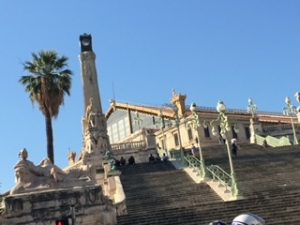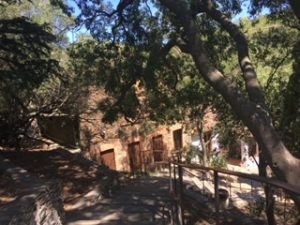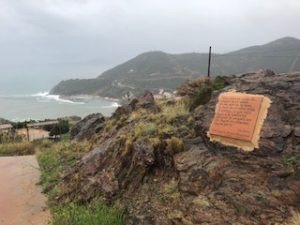On the Joys of On Location Research
 I was standing on the edge of the world, the deep blue Mediterranean Sea on one side and the great shoulders of the Pyrenees rising up on the other. Perched at the apex of the road that leads upward from Barcelona, one foot was planted in France and the other in Spain. A summer breeze rustled the grasses at my feet, and a nutty aroma of earth and vineyards and olives filled my lungs.
I was standing on the edge of the world, the deep blue Mediterranean Sea on one side and the great shoulders of the Pyrenees rising up on the other. Perched at the apex of the road that leads upward from Barcelona, one foot was planted in France and the other in Spain. A summer breeze rustled the grasses at my feet, and a nutty aroma of earth and vineyards and olives filled my lungs.
Anchored in the present of 2018, my mind flashed to the scenes I’d read about in my research for my historical fiction novel in progress The Forger of Marseille, scenes on that very road that now was marked by memorial plaques. In the winter of 1939, Spanish citizens struggled up that road, strafed by machine gun bullets from aimed from Stukas, the Spanish army clearly favoring the brutality Nazis would exhibit in the war to come. The monuments on that road revealed barbed wire enclosures that had been thrown up hastily by the French guards in fishing villages along the Mediterranean. The refugees slept in pitiful piles of sand, the sea lapping at their feet. Banyuls-sur-Mer, Argeles-sur-Mer, and Collioure—these fishing villages swarmed with refugees that winter and into the following year.
exhibit in the war to come. The monuments on that road revealed barbed wire enclosures that had been thrown up hastily by the French guards in fishing villages along the Mediterranean. The refugees slept in pitiful piles of sand, the sea lapping at their feet. Banyuls-sur-Mer, Argeles-sur-Mer, and Collioure—these fishing villages swarmed with refugees that winter and into the following year.
I hadn’t decided if I was really writing a novel for the first time, but I knew the era and wanted to witness the landscape where all these significant events had happened. For the novel, I’d identified a couple of my characters: Jewish refugees who’d fled Berlin in 1938. Sarah, a young artist and her father figure, Mr. Lieb, settled in Paris in 1938, watching warily as the war’s steady drumbeat grew louder and closer. At a Paris café, Sarah met a Spanish Republican who’d taken refuge in those refugee camps by the Spanish border. He’d been made cynical and wise by the loss of his country, his profession, and his family.
As I stood there on the border that day in 2018, Cesar tapped my shoulder. The wind whispered, and words swirled around me, and there was a voice in my ear as I “saw” the Spanish refugees on that road and heard their cries. Cesar, he told me his name, and said I needed him in my story. That he would help Sarah. He knew things no one else understood and he had to be in my book.
I thought about how I’d become rather obsessed with what had happened in Vichy France in 1940 just after the fall of France. It was filled with frightened refugees who’d been trapped in what had become a collaborationist country led by Phillippe Petain. Brave souls in the early resistance saved thousands of Jewish refugees and others who were stateless without papers or a country. The rescuers created safe houses for them, made sure they had properly forged papers and passports, and introduced them to guides who would lead them over the Pyrenees, starting in Banyuls-sur-mer.
 That afternoon on the mountain, the magic of time and history and imagination combined to insist that I write this novel that was barely formed in my mind. I wanted to know—who were the rescuers? Did they make a difference? I could see my characters pitching in, these escapees from Berlin and Cesar, to get involved helping the desperate people in Marseille. An American, Varian Fry, had arrived from New York, with $3000 taped to his leg, and a list in his pocket. He was supposed to rescue the crème de la crème of Europe’s artists, writers, and big thinkers and get them to America. But thousands lined up outside his door to be saved. His life was in danger as he, and my characters who joined him, worked in the underground. Sarah and Cesar produced false papers, and Mr. Lieb, well, he had his own life-threatening adventure in Vichy.
That afternoon on the mountain, the magic of time and history and imagination combined to insist that I write this novel that was barely formed in my mind. I wanted to know—who were the rescuers? Did they make a difference? I could see my characters pitching in, these escapees from Berlin and Cesar, to get involved helping the desperate people in Marseille. An American, Varian Fry, had arrived from New York, with $3000 taped to his leg, and a list in his pocket. He was supposed to rescue the crème de la crème of Europe’s artists, writers, and big thinkers and get them to America. But thousands lined up outside his door to be saved. His life was in danger as he, and my characters who joined him, worked in the underground. Sarah and Cesar produced false papers, and Mr. Lieb, well, he had his own life-threatening adventure in Vichy.
In a daze that day, I drove down the mountain and into the village of Banyuls-sur-Mer. Once a fishing village, it’s now a tourist spot, where people enjoy the beach and then taste the sweet wine grown on the foothills of the Pyrenees. It’s a village of many moods — on one side the beach and the sea, and on the other, you can feel the power of the mountain as it begins to rise. I saw the modest path that led from the train station. The refugees had been told to follow the woman in the red dress. Follow her to the safe house, and in the morning they’d be led up the mountain to the border.
I came to the village to witness the exact location where the refugees escaping the Vichy police and the Gestapo were guided up the mountain. If they had the correct papers, they could get into Spain, and catch a train to Lisbon. There, they’d take a ship to America or England, and leave Fortress Europe behind. The path was narrow, lined with shale rocks and low shrubs. All around the mountain breathed its ancient wisdom, holding secrets in the rocks and small caves.
catch a train to Lisbon. There, they’d take a ship to America or England, and leave Fortress Europe behind. The path was narrow, lined with shale rocks and low shrubs. All around the mountain breathed its ancient wisdom, holding secrets in the rocks and small caves.
I shuttered my eyelids and imagined the refugees wearing rope soled shoes, following the vignerons as they climbed up early in the morning to avoid being spotted by the Gestapo or the Vichy police. The wine workers would tend the vines as they had for hundreds of years, and quietly protect the refugees whose lives were being saved. I experienced a moment of reverence and gratitude that there were so many who risked their lives to save others in peril.
In that place where I was standing, a witness to history.
 About the Author
About the Author
LINDA JOY MYERS has always been deliciously haunted by the power of the past to affect people in the stream of time. She has integrated her passion for history and her own struggles with intergenerational trauma into her work as a therapist and writer. The power of the truth to educate current generations about the past led Linda Joy to explore the little-known history of WWII in the weeks following the fall of France— which in turn led her to write The Forger of Marseille. She is the author of two memoirs, Don’t Call Me Mother and Song of the Plains, and four books on memoir writing. She’s also the founder of the National Association of Memoir Writers. You can learn more about Linda Joy’s work at www.namw.org, http://theforgerofMarseille.com and www.lindajoymyersauthor.com. She lives in Berkeley, CA.
About the Book
It’s 1939, and all across Europe the Nazis are coming for Jews and anti-fascists. The only way to avoid being imprisoned or murdered is to assume a new identity. For that, people are desperate for papers. And for that, the underground needs forgers.
In Paris, Sarah, a young Jewish artist originally from Berlin, along with her music teacher and father figure, Mr. Lieb, meet Cesar, a Spanish Republican who knows well the brutality of fleeing fascism. He soon recognizes Sarah’s gift. She will become the underground’s new forger.
When the war reaches Paris, the trio joins thousands of other refugees in a chaotic exodus south. In Marseille, they’re received by friends, but they’re also now part of a resistance the government is actively hunting. Sarah, now Simone, continues her forgery work in the shadows, expertly creating false papers that will mean the difference between life and a horrifying death for many. When Mr. Lieb is arrested and imprisoned in Les Milles internment camp, Simone, Cesar, and their friends vow to rescue him, enlisting the help of American journalist Varian Fry, known for plotting the escapes of high- profile people like Andre Breton and Marc Chagall. In this enlightening and thrilling story of war, love, and courage, author Linda Joy Myers explores identity, ingenuity, and the power of art to save lives.


 Jill-Elizabeth LinkedIn
Jill-Elizabeth LinkedIn



Leave a Reply